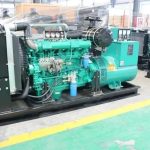Ensuring Reliability Standards with Diesel Generators

Introduction
In today's modern society, uninterrupted power supply is crucial for various industries, businesses, and essential services to function efficiently. Diesel generators play a vital role in providing backup power during grid failures or emergencies, ensuring continuous operations and preventing costly downtime. To maintain reliability standards, it is essential to understand the key factors that contribute to the effectiveness and dependability of diesel generators.
Overview of Diesel Generators
Diesel generators are a type of combustion engine that converts diesel fuel into mechanical energy, which is then converted into electrical energy through an alternator. These generators are commonly used in various applications, including industrial facilities, commercial buildings, data centers, hospitals, and construction sites. Diesel generators are preferred for their robustness, efficiency, and cost-effectiveness in providing backup power.
Reliability Standards for Diesel Generators
Reliability standards for diesel generators are essential to ensure that they perform optimally during emergencies or power outages. Several factors contribute to the reliability of diesel generators, including maintenance practices, fuel quality, load testing, and environmental conditions. Adhering to these standards helps prevent unexpected failures and ensures that the generator can provide uninterrupted power when needed.
Maintenance Practices
Regular maintenance is crucial for ensuring the reliability of diesel generators. Routine inspections, servicing, and testing help identify potential issues early on and prevent breakdowns during critical situations. Maintenance tasks include checking fuel levels, changing oil and filters, inspecting electrical connections, testing batteries, and monitoring coolant levels. By following a comprehensive maintenance schedule, operators can maximize the lifespan of the generator and minimize the risk of unexpected failures.
Fuel Quality
The quality of diesel fuel used in generators significantly impacts their reliability and performance. Contaminated or degraded fuel can clog filters, damage components, and lead to engine malfunctions. To maintain reliability standards, it is essential to use high-quality diesel fuel that meets industry standards and specifications. Regular fuel testing and treatment can help prevent issues related to fuel degradation, water contamination, and microbial growth, ensuring that the generator operates smoothly when needed.
Load Testing
Load testing is a critical aspect of ensuring the reliability of diesel generators. This process involves simulating real-world conditions by applying a load to the generator and monitoring its performance. Load testing helps identify any weaknesses or inefficiencies in the system, such as voltage fluctuations, frequency variations, or overheating. By conducting regular load tests, operators can verify the generator's capacity to handle the required load and make necessary adjustments to improve its reliability.
Environmental Conditions
Environmental factors can significantly impact the reliability of diesel generators. Extreme temperatures, humidity levels, dust, and debris can affect the performance and efficiency of the generator over time. 300kw diesel generator for remote power supply , cooling systems, and weatherproof enclosures can help protect the generator from adverse conditions and ensure its reliable operation. Regular inspections and maintenance checks can help identify and address any environmental issues that may compromise the generator's performance.

Best Practices for Ensuring Reliability
To maintain reliability standards with diesel generators, operators should follow best practices that include:
1. Establishing a comprehensive maintenance schedule that includes routine inspections, servicing, and testing.
2. Using high-quality diesel fuel and regularly testing and treating fuel to prevent contamination and degradation.
3. Conducting regular load tests to verify the generator's capacity and performance under varying load conditions.
4. Monitoring environmental conditions and implementing measures to protect the generator from adverse weather or environmental factors.
5. Training personnel on proper operation and maintenance procedures to ensure the generator's optimal performance and reliability.
By adhering to these best practices, operators can enhance the reliability of diesel generators and ensure continuous power supply during emergencies or grid failures.
Conclusion
Diesel generators play a crucial role in providing backup power for various industries and essential services, ensuring uninterrupted operations during emergencies or power outages. To maintain reliability standards, operators must prioritize maintenance practices, fuel quality, load testing, and environmental considerations. By following best practices and implementing preventive measures, operators can enhance the reliability of diesel generators and ensure continuous power supply when needed. Adhering to these standards is essential for businesses and organizations to mitigate risks associated with power outages and ensure smooth operations in today's fast-paced and interconnected world.
